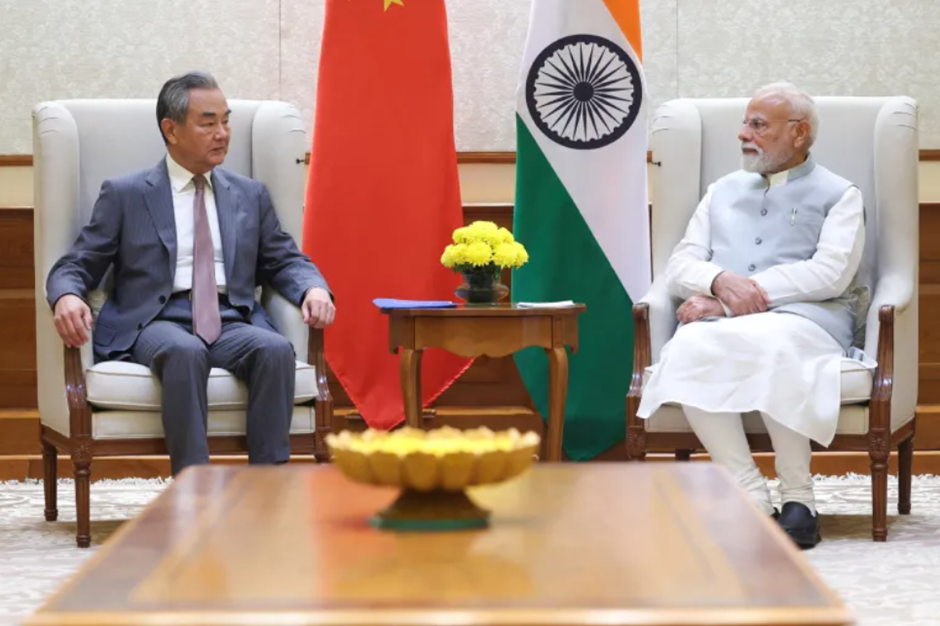Strengthening Ties: Key Takeaways from Chinese Foreign Minister Wang Yi's Visit to India
- InduQin
- Aug 21, 2025
- 3 min read
Chinese Foreign Minister Wang Yi’s visit to New Delhi marked progress in India-China relations. Key agreements included easing export restrictions on vital goods, resuming border trade, and flights. Talks with Indian officials addressed border stability, terrorism, and hydropower concerns. Both sides emphasized a rules-based multilateral system and a multipolar world order. Prime Minister Modi’s upcoming visit to China for the SCO summit aims to further normalize ties. Wang highlighted trust-building efforts, signaling an optimistic outlook for bilateral cooperation and regional stability.

Chinese Foreign Minister Wang Yi concluded a two-day visit to New Delhi on Tuesday, marking a significant step in fostering cooperation between India and China. During his discussions with Indian External Affairs Minister S. Jaishankar, Wang pledged to ease restrictions on the export of key commodities such as fertilizers, rare earth minerals, and tunnel-boring machines to India. The visit also saw the resumption of border trade and direct flights between the two nations, signaling a move toward normalizing relations.
Commitment to Multilateralism and Development
In a joint statement, both countries agreed to uphold a rules-based multilateral trading system centered on the World Trade Organization. They also emphasized the importance of promoting a multipolar world order that supports the interests of developing nations.
The discussions set the stage for Indian Prime Minister Narendra Modi’s upcoming visit to China later this month. Modi will attend the Shanghai Cooperation Organisation (SCO) summit in Tianjin, marking his first visit to China since 2018. On the sidelines of the summit, Modi is expected to meet Chinese President Xi Jinping for bilateral talks. These discussions are anticipated to yield further measures to stabilize relations, including potential agreements on border trade, flight operations, and de-escalation efforts along the frontier.
Key Discussions and Border Stability
During his visit, Wang Yi engaged in delegation-level talks with Jaishankar and met National Security Adviser Ajit Doval for the 24th round of the special representative mechanism on the boundary question. Wang also called on Prime Minister Modi, who highlighted the importance of maintaining peace along the border. Modi expressed optimism about the trajectory of India-China relations, noting steady progress since his last meeting with Xi Jinping in October 2024 during the BRICS summit in Kazan, Russia.
Modi emphasized that stable and constructive India-China ties could significantly contribute to regional and global peace and prosperity. In a social media post, he expressed eagerness to meet Xi at the SCO summit in Tianjin.
Talks with Doval delved into critical issues such as de-escalation and boundary matters. The Indian delegation raised strong concerns about cross-border terrorism, stressing the need to address the matter comprehensively.
Addressing Hydropower Projects and Fertilizer Needs
Jaishankar pressed China on its large-scale dam construction along the Yarlung Tsangpo (Brahmaputra) River, emphasizing the potential consequences for downstream nations. He called for greater transparency in data-sharing on river flows.
Meanwhile, Wang reassured Jaishankar of Beijing's commitment to fulfilling India's requirements for fertilizers, rare earth minerals, and tunnel-boring machinery. These discussions followed Jaishankar’s earlier visit to Beijing, where he had raised specific concerns regarding bilateral trade and cooperation.
Navigating Sensitive Issues
The issue of Taiwan also surfaced during the talks. Chinese state-run agency Xinhua reported that Jaishankar acknowledged Taiwan as part of China. However, India’s Ministry of External Affairs (MEA) later clarified that India’s position on Taiwan remains unchanged. The MEA highlighted that India, like many other nations, maintains economic, technological, and cultural ties with Taiwan, which would continue unabated.
Progress in Bilateral Relations
Doval noted a positive trend in India-China relations over the past nine months, citing increased stability along the Line of Actual Control (LAC). He emphasized the significance of the special representative-level dialogue in preparing for Modi’s visit to Tianjin.
Wang Yi expressed optimism about the current state of bilateral ties, stating that both sides should continue to build trust through strategic communication and cooperation. He acknowledged the importance of Modi’s upcoming visit to China and the opportunity it presents for enhancing relations.
Looking Ahead
As both countries work toward strengthening their partnership, the MEA announced Jaishankar’s upcoming trip to Moscow. He will co-chair the 26th session of the India-Russia Intergovernmental Commission (IRIGC-TEC), further underscoring India’s commitment to fostering regional and global cooperation.
Wang Yi’s visit to New Delhi has laid the groundwork for meaningful dialogue and collaboration between India and China. With Modi’s visit to China on the horizon, the bilateral relationship appears poised for a new chapter of stability and growth, benefiting not only the two nations but also the broader region.







Comments